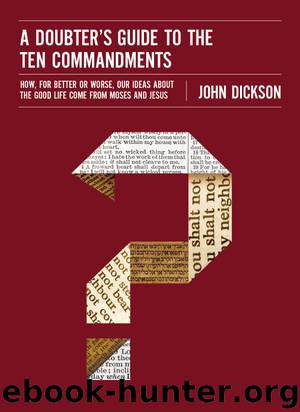A Doubter's Guide to the Ten Commandments: How, for Better or Worse, Our Ideas about the Good Life Come from Moses and Jesus by John Dickson

Author:John Dickson [Dickson, John]
Language: eng
Format: epub, mobi
Publisher: Zondervan
Published: 2016-06-06T16:00:00+00:00
8
FAMILY MATTERS: FIFTH COMMANDMENT
With the fifth commandment we move from Godward duties to humanward ones. It isn’t surprising that the first such command concerns the most profound and influential of all human ties — children to their parents:
Honour your father and your mother, so that you may live long in the land the LORD your God is giving you. (Exodus 20:12; Deuteronomy 5:16)
The command is straightforward, but the implications have been far-reaching for Western ethics, and continue to be so.
THE MYTH OF THE “NUCLEAR FAMILY”
I was recently interviewed for Australia’s ABC Radio National on the fraught topics of marriage and family. I imagine I was the token (semi-)conservative. The other guest was the immensely articulate Gene Robinson, the celebrated marriage equality campaigner and the first openly gay bishop of the Episcopal (or Anglican) Church of America. Part of his case for a new approach to marriage and family, made in the interview and in his publications, is the claim that the contemporary notion of the “family” is itself new and hardly known in biblical times:
We must be very careful not to project our current understanding of marriage and “family values” back onto an ancient time, when such notions would have been foreign to that culture. It must be noted that the model of family we have today — that is, the so-called nuclear family — would have been unknown in ancient times, when the extended family was the norm. Married couples often lived in a household with parents, children, and other relatives. People were much less mobile than today, and families lived, worked, and socialized as extended family units. One man married to one woman, living in a home with only their children, was a rarity. (Gene Robinson, God Believes in Love: Straight Talk about Gay Marriage [Knopf, 2012], 116)
Robinson’s point is that the modern world is too fixated on a model of family that is itself a recent creation. If the notion of “one man married to one woman, living in a home with only their children” is a cultural relativity, then we should be more open to other renditions of “family,” including where one man is married to another man, living in a home with (or without) children, and so on.
Without touching on the broader issue of same-sex relationships, Robinson is wide of the mark in his description of the historical family. He is right that critics of same-sex relationships need to be careful they don’t impose modern ideas onto biblical texts, but, equally, gay rights activists need to avoid the temptation to project their hypothetical ideals onto the historical record. There is a truth in what Robinson says, but it hides a significant falsehood.
Throughout history, as in the Bible, the prized norm of society has indeed been the “nuclear family.” It is true that these families were far more connected to other families than our highly mobile culture today allows, but no one back then imagined that the
Download
A Doubter's Guide to the Ten Commandments: How, for Better or Worse, Our Ideas about the Good Life Come from Moses and Jesus by John Dickson.mobi
This site does not store any files on its server. We only index and link to content provided by other sites. Please contact the content providers to delete copyright contents if any and email us, we'll remove relevant links or contents immediately.
Changing the Questions: Explorations in Christian Ethics by Margaret Farley(821)
The Broken Image by Leanne Payne(723)
Money, Possessions, and Eternity by Randy Alcorn(675)
Reset the Heart by Tran Mai-Anh Le;(620)
Introducing Christian Ethics by Scott Rae(545)
The Year without a Purchase by Scott Dannemiller(528)
Introduction to Christian Ethics by Marshall Ellen Ott;(512)
Bioethics and the Christian Life: A Guide to Making Difficult Decisions by David VanDrunen(502)
Old Testament Ethics for the People of God by Wright Christopher J. H(501)
Wholly Different: Why I Chose Biblical Values Over Islamic Values by Darwish Nonie(493)
A Doubter's Guide to the Ten Commandments: How, for Better or Worse, Our Ideas about the Good Life Come from Moses and Jesus by John Dickson(452)
A Theologico-Political Treatise, and A Political Treatise by Benedict de Spinoza(445)
How to Keep From Losing Your Mind by Deal Hudson(441)
Be the Bridge by LaTasha Morrison & Daniel Hill & Jennie Allen(423)
I Bring the Voices of My People by Chanequa Walker-Barnes(405)
The Spiritual Danger of Donald Trump: 30 Evangelical Christians on Justice, Truth, and Moral Integrity by Ronald J. Sider(402)
Managing God's Mutual Funds by Kenneth Copeland(392)
Divine Covenants and Moral Order (Emory University Studies in Law and Religion) by David VanDrunen(390)
A Serious Way of Wondering by Reynolds Price(380)
